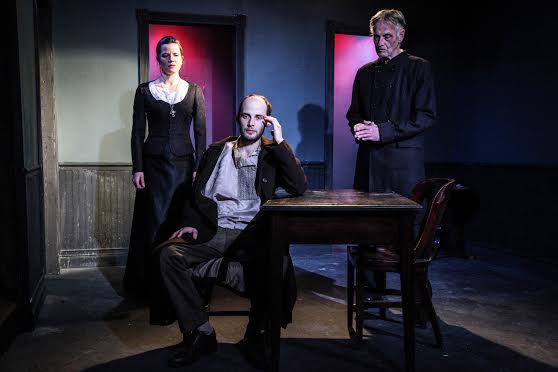Mary-Arrchie Theatre Co. Takes On Dostoyevsky's Bleak World
By Melody Udell in Arts & Entertainment on Feb 12, 2014 4:00PM

Crime and Punishment at Mary-Arrchie Theatre Co. Photo by Emily Schwartz.
“Would not one tiny crime be wiped out by thousands of good deeds?”
Therein lies the main psychological conundrum posed by Raskolnikov, Fyodor Dostoyevsky's infamously self-aware criminal in the epic Russian novel Crime and Punishment, now being staged by Mary-Arrchie Theatre Co.
A poor student in 19th century St. Petersburg, Raskolnikov (Ed Porter) describes himself as a thinker, and he’s obsessed with the idea that the act of murder could—in the right circumstance—be elevated from a heinous crime to a moral deed committed for the good of humanity.
The script, adapted from the book in 2003 by local playwrights Marilyn Campbell and Curt Columbus, weaves in Raskolnikov’s maddening ethical theories into an alinear drama, which is aided in large part by John Holt’s stark scenic design. Aged wood floors, a cramped staircase apartment and the dimly lit interrogation room all contribute to the play’s dark, brooding atmosphere—fitting for a show that attempts to probe the true motives behind the act of killing.
We first meet Raskolnikov as he’s being politely questioned by Inspector Porfiry (Jack McCabe). Hard-line questions and fist-slamming accusations aren’t Porfiry’s type of interrogation. Instead, he’s playing coy, engaging Raskolnikov in a witty battle of right-and-wrong—all in an attempt to discover who killed the local pawn broker and her sister. Raskolnikov, believing in his own moral and intellectual superiority, argues that great leaders mustn’t let anything stop them. Napoleon, he believes, had a right to kill in order to charge ahead and accomplish his goals.
In between his interrogation sessions at the jail, Raskolnikov reenacts the hours leading up to the murder. He meets his equal in bleak, urban misery in the form of Sonia (Maureen Yasko), a young woman forced into prostitution in order to feed her family after her father’s death. But unlike Raskolnikov, Sonia clutches to her faith in an effort to subdue her bitterness. Despite his judgmental—and hypocritical—feelings toward her profession, Raskolnikov gives into his isolation by asking Sonia to run away with him. In their scenes together, Porter and Yasko radiate shared angst and psychological trauma, but ultimately, Sonia’s weak excuses for forgiving Raskolnikov his crimes fail to sway the skeptical crowd.
Porfiry, too, comes off as weaker than he should. He’s fully aware of Raskolnikov’s deeds, but his quiet efforts to subdue him seem uninspired rather than calculating, contributing to a lack of much-needed (albeit attempted) suspense.
The only one of the three actors playing just a single part, it’s Porter who really shines. Despite his flawed thinking and obvious inner demons, Porter shows us a Raskolnikov who is—above all else—simply lost. Knowledge is his power, but it turns out he can’t actually wield it, especially when others fail to see the intellectual gifts that, according to him, truly put his crimes above reproach.
Crime and Punishment runs through Sunday, March 16 at Angel Island, 731 W. Sheridan Rd., 773-871-0442 or online.